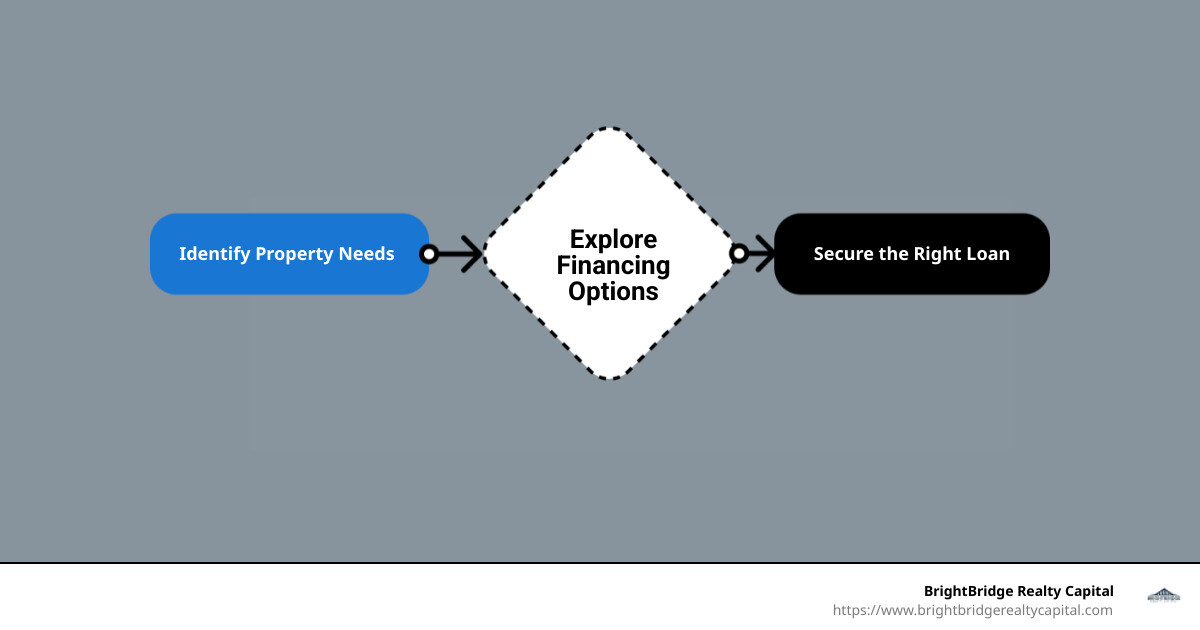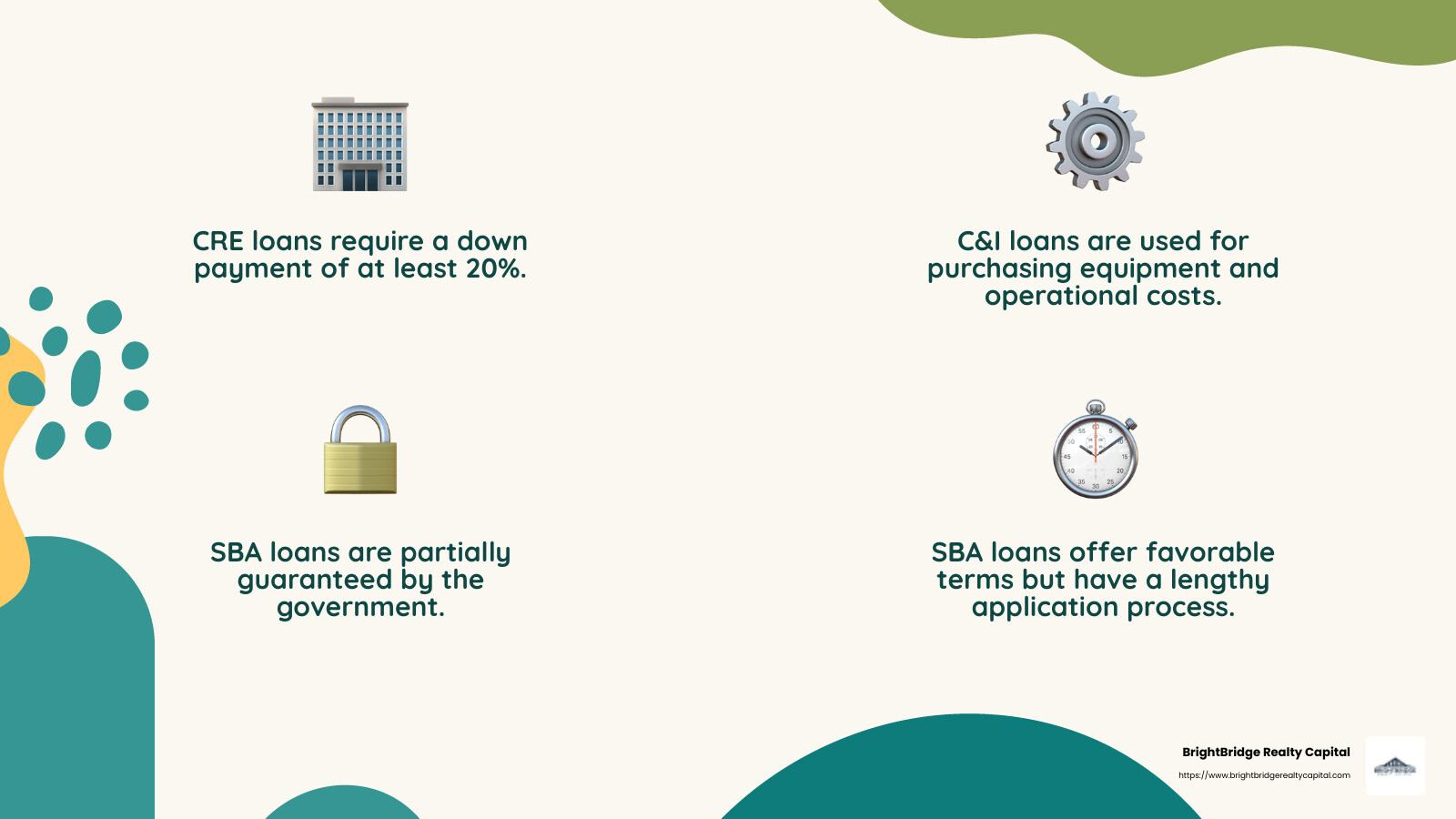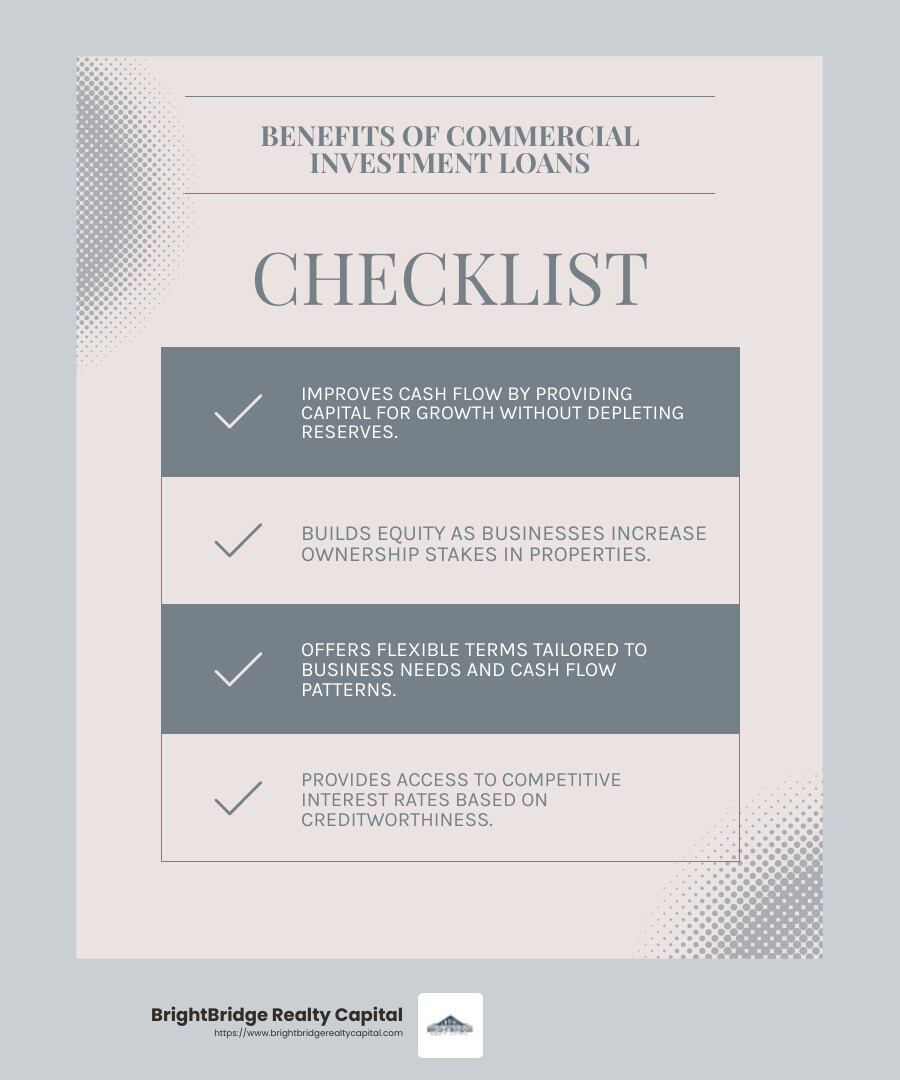Navigating the World of Commercial Investment Loans

Commercial investment loans are a key tool for real estate investors aiming to expand their portfolios or dive into new projects. These loans provide the necessary financial backing to purchase, renovate, or develop commercial properties, which can range from multifamily dwellings to office spaces and retail centers.
- Purpose: To finance commercial properties for business use
- Lenders: Banks, independent lenders, insurance companies, and the SBA
- Key Features: No personal income requirement, variable and fixed rates, and potential for multiple properties in a portfolio
Navigating commercial loans can be challenging, especially in the current market landscape following the 2023 banking crisis. Traditional lending routes may be limited, but there are still opportunities available through innovative lenders like BrightBridge Realty Capital. These lenders focus on providing flexible, fast, and competitive financing options that meet the unique needs of real estate investors.
Understanding the changing dynamics of commercial real estate financing is crucial. Many investors are finding that non-traditional lenders offer them the advantage of quicker processing and fewer stringent requirements, which can be a game-changer in capturing timely investment opportunities.

Know your commercial investment loans terms:
Understanding Commercial Investment Loans
Commercial investment loans are a form of debt-based financing designed to help businesses cover large expenses. These loans are crucial for buying, developing, or refinancing commercial properties like office buildings, retail centers, and multi-family homes.
Debt-Based Financing
At its core, a commercial investment loan is a debt-based funding arrangement. This means a business borrows money from a lender and agrees to repay it over time with interest. This type of financing allows businesses to make significant investments without needing all the cash upfront.
- How it Works: Businesses receive a lump sum from the lender and repay it in installments.
- Interest Rates: Vary depending on the creditworthiness of the borrower and market conditions.
- Repayment Terms: Can range from a few years to several decades, depending on the loan type and lender.
Covering Business Expenses
Commercial investment loans are not just about buying properties. They also help cover various business expenses related to real estate investments.
- Renovations and Improvements: Use the loan to upgrade or remodel properties, increasing their value and appeal.
- Operational Costs: Funds can be allocated to manage day-to-day expenses, like maintenance and staffing.
- Expansion: These loans enable businesses to expand their footprint by acquiring additional properties.
Commercial Real Estate
Investing in commercial real estate can be highly profitable, but it requires significant capital. Commercial investment loans provide the financial support needed to enter this market.
- Types of Properties: Include office buildings, retail spaces, multi-family units, and more.
- Benefits: Potential for higher returns compared to residential properties, especially in prime locations.
- Risks: Include market fluctuations and unforeseen property management challenges.

Understanding the intricacies of commercial investment loans is essential for any business looking to invest in real estate. These loans offer the necessary capital to seize opportunities in the commercial property market, helping businesses grow and thrive.
Next, we'll explore the different types of commercial investment loans available and how they can be custom to meet specific business needs.
Types of Commercial Investment Loans
When diving into commercial investment loans, it's crucial to understand the various types available. Each type serves different business needs and comes with its own set of features and benefits. Let's break down the most common ones:
CRE Loans (Commercial Real Estate Loans)
CRE loans are specifically designed for real estate investments. They are typically used to purchase, refinance, or improve commercial properties like office buildings, shopping centers, and apartment complexes.
- Loan Structure: Often requires a down payment of at least 20%. Some loans may feature balloon payments or shorter terms.
- Benefits: Provides capital for large-scale real estate projects, potentially leading to significant returns.
- Risks: Market fluctuations can affect property values, impacting the profitability of the investment.
C&I Loans (Commercial and Industrial Loans)
C&I loans are not tied to real estate but are instead used for business operations and growth. They can finance equipment, inventory, and other business needs.
- Loan Purpose: Typically used for purchasing equipment, funding operational costs, or supporting business expansion.
- Flexibility: Offers more diverse use of funds compared to CRE loans.
- Repayment Terms: Generally shorter than real estate loans, often ranging from one to seven years.
SBA Loans
SBA loans are partially guaranteed by the Small Business Administration, making them less risky for lenders and more accessible for borrowers with less-than-perfect credit.
- Types: Includes popular options like the SBA 7(a) loan and SBA 504 loan, each catering to different borrower needs.
- Application Process: Can be lengthy, but offers favorable terms and lower down payments.
- Usage: Suitable for a variety of business purposes, from real estate purchases to equipment financing.

Choosing the Right Loan
Selecting the right type of commercial investment loan depends on the specific needs of your business. Whether it's investing in real estate, expanding operations, or purchasing equipment, understanding these loan types will help you make an informed decision.
Next, we'll explore the benefits of commercial investment loans and how they can improve your business's financial health.
Benefits of Commercial Investment Loans
Commercial investment loans offer several advantages that can significantly boost your business's financial health. Let's explore how these loans can improve cash flow, build equity, and provide flexible terms.
Cash Flow Improvement
One of the major benefits of commercial investment loans is the potential for cash flow improvement. By leveraging these loans, businesses can access the necessary capital to invest in growth opportunities without depleting their cash reserves.
- Example: A company might use a commercial loan to purchase an office building, which can then be leased out to generate rental income. This additional revenue stream can improve the company's cash flow and overall financial stability.
Building Equity
Investing in commercial properties through these loans allows businesses to build equity over time. As loan payments are made, the business gradually increases its ownership stake in the property.
- Long-term Advantage: Owning a commercial property can lead to substantial appreciation in value, building significant equity that can be leveraged for future investments or expansions.
Flexible Terms
Commercial investment loans often come with flexible terms that can be custom to meet the specific needs of a business. This flexibility can make it easier for businesses to manage their financial commitments.
Customizable Options: Loan terms can vary in length and structure, allowing businesses to choose repayment plans that align with their cash flow patterns and long-term goals.
Interest Rates: Depending on the lender and the borrower's creditworthiness, businesses might have access to competitive interest rates, making these loans an attractive option for financing.

These benefits make commercial investment loans a powerful tool for businesses looking to grow, improve their financial standing, and capitalize on new opportunities.
Next, we'll dive into the qualifications needed to secure a commercial investment loan and how businesses can position themselves for success in the application process.
How to Qualify for a Commercial Investment Loan
Securing a commercial investment loan can be a game-changer for your business, but getting approved requires meeting specific criteria. Here's what you need to know about qualifying for these loans.
Creditworthiness
Your credit score is a critical factor in the loan approval process. Lenders use it to gauge your ability to repay the loan.
Personal and Business Credit: Both your personal and business credit scores matter. Aim for a score above 650 to increase your chances of approval.
Tip: Keep your credit utilization low and ensure timely payments to maintain a strong credit profile.
Business Relationship
Building a solid relationship with your lender can improve your chances of securing a loan.
Trust and Communication: Regular communication and a history of reliable transactions with your lender can make a significant difference.
Lender Loyalty: Existing relationships might lead to better loan terms and quicker approval processes.
Down Payment
The down payment is a crucial component of qualifying for a commercial loan. It shows your commitment to the investment.
Typical Requirement: Most lenders require a down payment ranging from 15% to 35% of the property's purchase price.
Higher Down Payment: Offering a larger down payment can sometimes compensate for lower credit scores or other risk factors.
Additional Tips
Business Plan: A well-documented business plan can demonstrate your business's potential and your ability to manage the loan effectively.
Financial Health: Ensure your business's financial statements are up-to-date and accurately reflect its stability and growth potential.
Understanding these key elements can help you steer the loan application process with confidence. Next, we'll address some frequently asked questions about commercial investment loans, including down payment norms and interest rate variations.
Frequently Asked Questions about Commercial Investment Loans
What is the typical down payment for a commercial loan?
When it comes to commercial investment loans, the down payment is often one of the first problems. Typically, lenders require a down payment ranging from 15% to 35% of the property's purchase price. This varies based on several factors like the type of property and the borrower's credit profile.
Higher Down Payments: Some lenders may ask for more if the loan is considered high-risk. Offering a larger down payment can sometimes help if other aspects of your application, like credit score, are weaker.
Collateral and Equity: Besides cash, some lenders may accept collateral like other properties or business assets to secure the loan.
How do commercial real estate loan rates vary?
Interest rates for commercial real estate loans can fluctuate based on multiple factors. Understanding these can help you secure a loan with favorable terms.
Creditworthiness: Your credit score has a significant impact on the interest rate. Higher scores often lead to lower rates.
Financial Health of the Business: Lenders will look at your business's financial statements. A strong financial position can help you secure better rates.
Market Conditions: Economic factors and market trends can also influence interest rates. Lenders may adjust rates based on the current economic climate.
What types of properties can be financed with commercial loans?
Commercial investment loans are versatile, allowing you to invest in a variety of properties. Here’s a quick overview of the types of properties you can finance:
Multi-Family Properties: These include apartment complexes and other residential buildings with multiple units. They are popular for generating rental income.
Retail Spaces: From small shops to large shopping centers, retail spaces can be financed through commercial loans.
Office Buildings: Whether you’re looking at a single office or a large office complex, commercial loans can help you acquire these properties.
Other Commercial Properties: This includes warehouses, hotels, and industrial spaces. Essentially, any property used for business purposes can be financed with a commercial loan.
These loans provide flexibility and opportunities to invest in diverse property types, allowing you to expand or diversify your real estate portfolio.
Next, we’ll explore how BrightBridge Realty Capital can assist you in navigating commercial investment loans with ease and efficiency.
Conclusion
Navigating commercial investment loans doesn't have to be complicated. At BrightBridge Realty Capital, we specialize in providing custom real estate financing solutions that are both quick and flexible. Our unique approach ensures that you can seize investment opportunities without the usual delays.
Fast Closings: One of our standout features is the ability to close deals swiftly—often within a week. This speed is crucial in the real estate market, where timing can be everything. With us, you won't miss out on lucrative deals due to prolonged closing processes.
Direct Lending: We cut out the middleman by offering direct lending services. This not only simplifies the process but also allows us to offer competitive rates that are hard to beat. Our streamlined approach means fewer problems and more straightforward access to the funds you need.
Our team is committed to making your investment journey as smooth as possible. With our expertise and dedication, you can confidently expand your real estate portfolio and achieve your investment goals.
Ready to take the next step? Explore our services at BrightBridge Realty Capital and find how we can help you succeed in the commercial real estate market.


